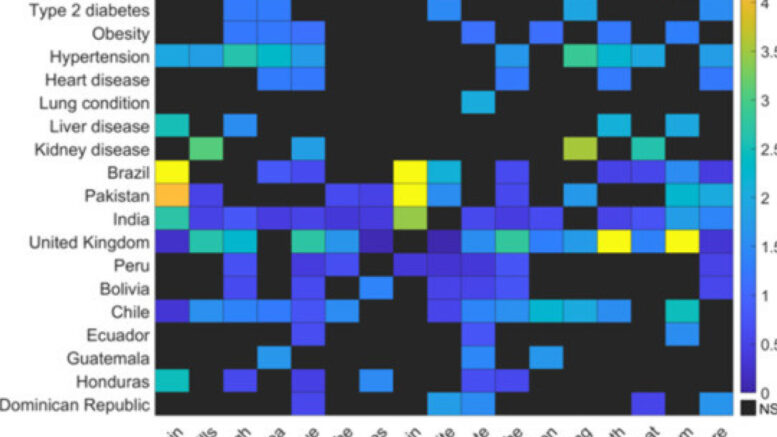Looking at 190 countries, researchers from Imperial College London found that symptoms of COVID-19, including the initial trifecta of cough, fever, and loss of smell, varied by both country and presence of underlying health conditions like asthma and diabetes. This is the first study to explore symptoms among those who test positive for COVID-19 by geolocation and underlying chronic disease.
The research, led by Imperial College London and published in eClinicalMedicine, analyzed data on symptoms reported by 78,299 individuals in 190 countries between April and September 2020. Of these, 64,699 were symptomatic and untested, 7,980 tested positive, and 5,620 tested negative.
Researchers at Imperial’s Global Covid Observatory partnered with an online symptom mapper called Healthily, previously known as Your.MD, to collect and analye self-reported symptom data.
The researchers say the study creates a framework for further research to use global self-reported data in identifying parallels between health conditions, world region, and symptom profile of infectious diseases.
Joint senior author Professor Aldo Faisal, of Imperial’s Departments of Computing and Bioengineering, said: “Understanding symptom variation by location and health is crucial for clinical practice. It could help speed up diagnosis, predict outcomes more precisely, and target treatment – particularly with the emergence of new variants."
Joint senior author professor Céire Costelloe, of Imperial’s School of Public Health, said, “Global snapshots like these can help to inform our treatment of patients, whose age and underlying health conditions like asthma or diabetes will likely affect their COVID-19 symptoms and outcome. The approach could also help to inform public health messaging and practice by monitoring in real-time the effects of new outbreaks or variants on a population.”
The symptom mapper was advertised primarily on social media and surveyed both tested and untested individuals so that countries with poor testing infrastructure could still be included. Because the data represents a snapshot of symptoms from the early stage of the pandemic, the symptoms relate only to the initial Sars-CoV-2 strains circulating between April and September 2020 and do not relate to subsequent variants such as Delta or Omicron.
Most responses were from India (22.5%), Mexico (16.8%), Pakistan (9.5%), Philippines (9%), United Kingdom (5.7%), and Brazil (5.5%), and the researchers used a machine learning technique called clustering to identify similarities between the symptom profile of different countries and underlying health conditions.
Responders who tested positive were more likely to report joint pain, loss of appetite, and loss of smell and taste than responders who had tested negative or had symptoms but had not been tested. Fewer responders who had tested positive for COVID-19 reported sore throat and nasal congestion than those who had tested negative or had symptoms but were untested.
Of responders who were COVID-19 positive, 60.3% had no underlying chronic disease, 30.7% had one underlying chronic disease, 7.1% reported two underlying chronic diseases, and 1.9% reported three or more. These rates of underlying chronic disease mirrored those responders who tested negative or had symptoms but were untested.
Respondents with underlying lung conditions and/or Type 2 diabetes were more likely to report several symptoms than respondents with no underlying conditions.
COVID-19 positive responders with asthma were more likely to report fatigue (62.3% vs 49.8%) headache (56.2% vs 45.8%), shortness of breath (25.3% vs 13.7%), sputum production (17.4% vs 10.7%), chest pain (12.4% vs 6.8%), chills (26.8% vs 17.1%), or diarrhea (31.3% vs 22.7%), compared with COVID-19 positive responders who had no underlying disease.
COVID-19 positive responders with an underlying lung condition, like COPD, were more likely to report chest pain (15.2% vs 6.8%) and sputum (22.2% vs 10.7%) as a symptom, but less likely to report loss of smell and taste (29.3% vs 46.0%) compared with COVID-19 positive responders who had no underlying disease.
COVID-19 positive responders with Type 2 diabetes were more likely to report a raised temperature (26.1% vs 17.6%).
Loss of smell and taste was more likely to be reported as a symptom amongst COVID-19 positive responders with no underlying disease (46.0%) compared with responders who had a lung condition (29.3%), Type 1 diabetes (21.3%), Type 2 diabetes (33.5%), or high blood pressure (37.8%).
Several countries reported chest and joint pain more frequently than others. Respondents in Brazil were five times more likely to report chest pain and joint pain than other countries. Respondents in Pakistan were four times more likely to report chest pain and five times more likely to report joint pain. Respondents in India were three times more likely to report chest pain and four times more likely to report joint pain.
The UK’s symptom profile differed from the majority of countries, which the researchers say could be because its respondents were overall older than those of other countries. Respondents in the UK were five times more likely to report shortness of breath and sputum, and three times more likely to report chills, fatigue, and headache.
The research provides a global snapshot of symptoms – an approach that could help to track variation in symptoms and identify changes linked to future variants or vaccination status. First author Dr. Balasundaram Kadirvelu, of the Department of Computing, said, “Although many around the world have been hospitalized, most people who contract COVID-19 treat it at home with no clinical contact. These self-reported data allow us to capture the symptom profiles of patients not in contact with health services. In doing so, they offer a new perspective on the pandemic.”
Faisal said, “This example of citizen science and digital public health could help us recover from the current pandemic and inform the response to future ones."
The research was funded by UK Research and Innovation (UKRI) and National Institute for Health Research (NIHR).
“Variation in global COVID-19 symptoms by geography and by chronic disease: a global survey using the COVID-19 Symptom Mapper” by Balasundaram Kadirvelu, Gabriel Burcea, Jennifer K Quint, Ceire E Costelloe, and A. Aldo Faisal, published March 2022 in eClinicalMedicine.
